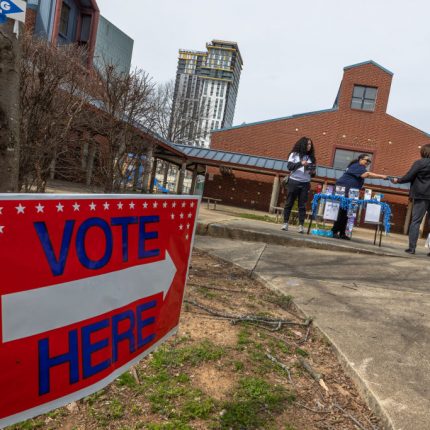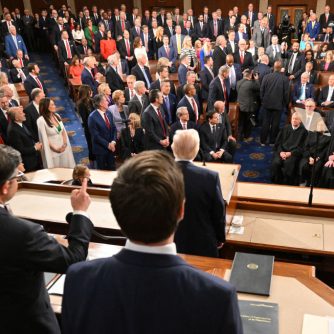On this episode of Carolina Newsmakers, Don Curtis welcomes Mitch Kokai, Senior Political Analyst at the John Locke Foundation, to discuss the political landscape in North Carolina and the broader national stage as new administrations take shape. The conversation covers the impact of the 2024 elections, anticipated policy shifts under the new federal and state leadership, and the evolving role of artificial intelligence in governance and media.
The Republican-Controlled Congress and Trump’s Second Term Strategy
With Republicans controlling both the U.S. House and Senate, Kokai explores how they may respond to President Trump’s policy agenda. Unlike his first term, Trump enters office with a clearer vision and a more strategic approach. Kokai predicts swift action through executive orders, with potential early moves on immigration, tariffs, tax policy, and energy production.
One key area of debate will be tariffs. While Trump’s aggressive trade policies have been a signature stance, they have drawn criticism even from within his own party. Kokai notes that imposing tariffs on Canada and Mexico could have unintended consequences, potentially fueling inflation and creating division among congressional Republicans.
Trump’s stance on the Ukraine war has also evolved. Once claiming he could end the conflict in a day, he has since tempered expectations. Kokai suggests that while Trump’s approach may shift the dynamics of the war, resolving it quickly is unrealistic.
North Carolina’s Political Landscape Under Governor Josh Stein
North Carolina’s state government also faces a transition, with Democrat Josh Stein taking office as governor. Kokai explains that while Republicans maintain control of the General Assembly, they no longer hold a veto-proof majority in the House. This means that bipartisan cooperation—or strategic political maneuvering—will determine how much of Stein’s agenda moves forward.
The General Assembly has spent years stripping powers from the governor’s office, reducing the executive branch’s influence. While Stein has experience working with the legislature from his time as attorney general, Kokai believes his administration will face significant hurdles, particularly on controversial issues like school choice and tax policy.
A notable change in state government is the departure of longtime House Speaker Tim Moore, with Rep. Destin Hall stepping into the role. Kokai highlights the importance of Hall’s leadership style and how it may influence cooperation—or conflict—between the House and Senate, as past tensions between the two chambers have stalled legislative progress.
Election Integrity and Structural Changes to the Board of Elections
A major shift in North Carolina politics is the restructuring of the State Board of Elections, which has been placed under the oversight of the state auditor. Kokai describes this move as an unprecedented change, with North Carolina now being the only state where the elections board operates under the auditor’s authority. While new Auditor Dave Boliek has a solid reputation, the structural change is widely seen as a political maneuver to ensure Republican oversight of elections.
This move is likely to face legal challenges, and Kokai warns that any attempt to alter election administration must be handled transparently to maintain public trust.
Upcoming Senate Race: Thom Tillis and Potential Challengers
One of the biggest upcoming political battles in North Carolina is the 2026 Senate race. Incumbent Republican Thom Tillis has signaled his intent to run for re-election, but he faces skepticism from conservative activists who have long questioned his alignment with Trump’s base.
Democrats see this as a prime opportunity to flip a Senate seat, with outgoing Governor Roy Cooper emerging as the strongest potential challenger. While Cooper’s statewide popularity makes him a formidable candidate, Kokai is unsure whether he will actually run, noting that he may prefer to maintain his strong political influence outside of elected office.
If Cooper declines, potential Democratic candidates include former Congressman Wiley Nickel and Attorney General Jeff Jackson. Kokai emphasizes that the race could become one of the most expensive and closely watched Senate battles in the country, especially if control of the U.S. Senate hangs in the balance.
Artificial Intelligence and Its Impact on Politics and Media
The conversation shifts to the growing influence of artificial intelligence (AI) in governance and media. Kokai expresses concern about AI’s potential misuse, particularly in politics. The ability to generate deepfake videos and AI-generated misinformation poses new challenges for election integrity and public trust.
While AI can serve as a useful tool for data analysis and efficiency, Kokai warns against overreliance on technology at the expense of human expertise. He also highlights the need for responsible AI regulations that balance innovation with safeguards against manipulation.
The Future of Journalism and Public Trust in Media
Kokai reflects on the decline of traditional media, particularly newspapers, and the growing influence of social media as a primary news source. He argues that while mainstream media once held a monopoly on public information, today’s fragmented media landscape has led to polarization, as individuals increasingly seek out news sources that align with their existing beliefs.
He stresses the importance of exposing oneself to different viewpoints, recalling former Congressman David Price’s practice of listening to conservative talk radio to better understand opposing perspectives. Kokai encourages media consumers to be critical thinkers and seek out balanced reporting to stay informed.
Conclusion
Mitch Kokai provides a comprehensive analysis of the shifting political landscape in North Carolina and beyond. With changes at both the federal and state levels, the next few years promise intense legislative battles, major electoral showdowns, and evolving debates over the role of technology in politics. As North Carolina remains a key battleground state, Kokai emphasizes the importance of staying engaged and informed as these developments unfold.





